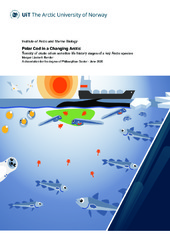| dc.contributor.advisor | Nahrgang, Jasmine | |
| dc.contributor.author | Bender, Morgan Lizabeth | |
| dc.date.accessioned | 2020-05-14T12:18:22Z | |
| dc.date.available | 2020-05-14T12:18:22Z | |
| dc.date.issued | 2020-06-12 | |
| dc.description.abstract | Environmental change in the Arctic is occurring at an unprecedented rate with a loss of sea ice and warmer sea temperatures, simultaneously as increased human activity in the Arctic poses a risk of petroleum pollution. The potential future of a key Arctic forage fish, polar cod (<i>Boreogadus saida</i>), was investigated using laboratory simulations of oil spills during sensitive life-history stages: maturation, post-spawning, and early life stages. I hypothesized that exposure to crude oil would result in adverse effects on individual fitness during these sensitive life-history stages. Changes in growth, metabolism, reproduction, and survival were followed to provide an integrated response to determine the risk to individual fitness to deliver more robust predictions for effects at the population and ecological levels. Findings reveal the physiological robustness of mature stages of polar cod chronically exposed to low levels (post-spill concentrations) or acutely to high (present-spill) crude oil concentrations. Effects observed on sperm motility under dietary exposure and gonadal development in females exposed to burned oil residues, an oil spill response action, require follow-up examination, especially in light of the importance of gamete quality to individual fitness. Reduced energy reserves and condition in the post-spawning stage suggests increased physiological sensitivity of this life-history stage. The high sensitivity of eggs and larvae to low levels of crude oil was further amplified by a 2.3°C increase in water temperature. The interactive effects of warmer water and low levels of petroleum pollution demonstrate the vulnerability of polar cod early life stages. Determining how the sentinel species, polar cod, will respond to these environmental and ecological stressors and what influence this will have on the resilience of the Arctic marine ecosystem is the future aim of this research. | en_US |
| dc.description.doctoraltype | ph.d. | en_US |
| dc.description.popularabstract | Around the Arctic, polar cod are an abundant and tasty fish for birds, seals, whales, and humans. Their important role in the ecosystem makes them an attractive species to understand the potential consequences of an oil spill in the Arctic. I have simulated several oil spills in the lab and investigated the effects on polar cod maturation, reproduction, and eggs and larvae – all critical stages for the success of the species. I find that mature and reproducing polar cod are rather robust to low levels of crude oil in their food and oil spill cleanup methods. However, I do see minor effects on sperm motility and egg maturation. Eggs and larvae were very sensitive to even low levels of crude oil in the water and hatched with deformities, unable to grow or feed, and these effects were more severe when eggs were kept in warmer water. Polar cod can’t answer all of our questions about the future of the Arctic under climate change and increased human activity, but they do serve as a sentinel species to understand ecosystem changes. | en_US |
| dc.identifier.isbn | 978-82-8266-180-5 | |
| dc.identifier.uri | https://hdl.handle.net/10037/18289 | |
| dc.language.iso | eng | en_US |
| dc.publisher | UiT The Arctic University of Norway | en_US |
| dc.publisher | UiT Norges arktiske universitet | en_US |
| dc.relation.haspart | <p>Paper I: Bender, M.L., Frantzen, M., Vieweg, I., Falk-Petersen, I.B., Johnsen, H.K., Rudolfsen, G., … Nahrgang, J. (2016). Effects of chronic dietary petroleum exposure on reproductive development in polar cod (<i>Boreogadus saida</i>). <i>Aquatic Toxicology, 180</i>, 196-208. Also available in Munin at <a href=https://hdl.handle.net/10037/9857>https://hdl.handle.net/10037/9857</a>.
<p>Paper II: Nahrgang, J., Bender, M.L., Meier, S., Nechev, J., Berge, J. & Frantzen, M. (2019). Growth and metabolism of adult polar cod (<i>Boreogadus saida</i>) in response to dietary crude oil. <i>Ecotoxicology and Environmental Safety, 180</i>, 53–62. Also available in Munin at <a href=https://hdl.handle.net/10037/16972>https://hdl.handle.net/10037/16972</a>.
<p>Paper III: Bender, M.L, Frantzen, M., Camus, L., LeFloch, S., Palerud, J. & Nahrgang, J. (2018). Effects of acute exposure to dispersed oil and burned oil residue on long-term survival, growth and reproductive development in polar cod (<i>Boreogadus saida</i>). <i>Journal of Marine Environmental Research, 140</i>, 468-477. Also available at <a href=https://doi.org/10.1016/j.marenvres.2018.09.005> https://doi.org/10.1016/j.marenvres.2018.09.005</a>. Accepted manuscript version available in Munin at <a href=https://hdl.handle.net/10037/14478>https://hdl.handle.net/10037/14478</a>.
<p>Paper IV: Bender, M.L., Giebichenstein, J., Teisrud, R.N., Laurent, J., Frantzen, M., Meador, J., … Nahrgang, J. Interactive effects of crude oil pollution and warming on polar cod early life stages. (Manuscript). | en_US |
| dc.rights.accessRights | openAccess | en_US |
| dc.rights.holder | Copyright 2020 The Author(s) | |
| dc.subject.courseID | DOKTOR-002 | |
| dc.subject | VDP::Mathematics and natural science: 400::Zoology and botany: 480::Ecotoxicology: 489 | en_US |
| dc.subject | VDP::Matematikk og Naturvitenskap: 400::Zoologiske og botaniske fag: 480::Økotoksikologi: 489 | en_US |
| dc.subject | VDP::Mathematics and natural science: 400::Zoology and botany: 480::Marine biology: 497 | en_US |
| dc.subject | VDP::Matematikk og Naturvitenskap: 400::Zoologiske og botaniske fag: 480::Marinbiologi: 497 | en_US |
| dc.subject | VDP::Mathematics and natural science: 400::Zoology and botany: 480::Zoophysiology and comparative physiology: 483 | en_US |
| dc.subject | VDP::Matematikk og Naturvitenskap: 400::Zoologiske og botaniske fag: 480::Zoofysiologi og komparativ fysiologi: 483 | en_US |
| dc.title | Polar Cod in a Changing Arctic. Toxicity of crude oil on sensitive life history stages of a key Arctic species | en_US |
| dc.type | Doctoral thesis | en_US |
| dc.type | Doktorgradsavhandling | en_US |


 English
English norsk
norsk